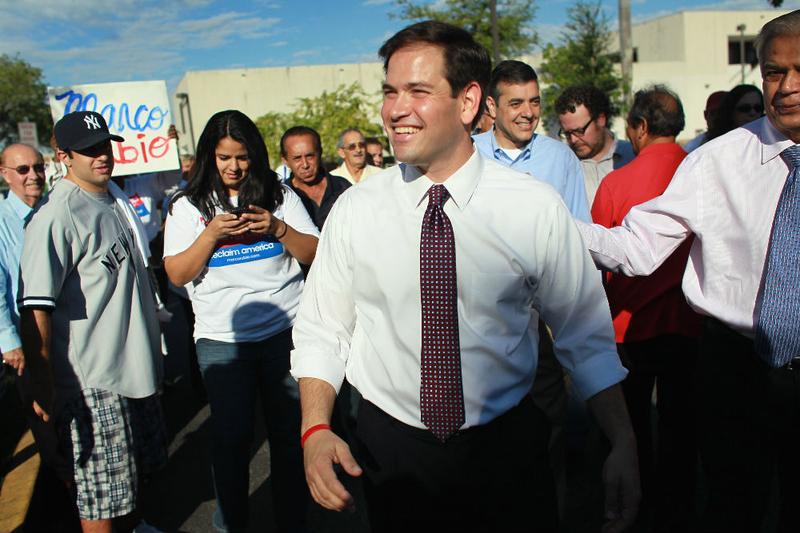
With Mitt Romney’s path to the top of the Republican ticket clearer than ever, focus is shifting to the number two spot on the GOP ticket. One potential vice presidential candidate, Florida Senator Marco Rubio appears to be bolstering his chances to become Romney’s running mate with a strategy to salvage the GOP’s reputation with Latino voters.
Rubio has announced that he is working on a new version of the DREAM Act, which is supported by more than 90 percent of Latinos. Under the Democrat-sponsored bill, undocumented young people who were brought to the U.S. as children could earn a path to citizenship by attending college or joining the military.
The key difference in Rubio’s plan is that it would legalize the status of undocumented young people, but not put them on a path towards citizenship And while the first-term Cuban-American senator has not released details of his plan, just the suggestion that he’s getting into the debate has already created a buzz among conservatives, liberals and key Latino groups.
Rubio has said that conferring citizenship on undocumented youth will create “chain migration” where young people can then sponsor and bring their families to the United States, but The New York Times editorial page condemned his proposal as a “a DREAM Act without the dream.”
In an interview with the Tampa Bay Times, Rubio defended his plan.
“There is nothing that prohibits them from getting citizenship," he said. "We just don't create a new pathway. Someone would say, 'Well, it's going to take them forever to get residency.' Well, that's true of anybody. The system has to be modernized but that's a separate topic."
Rubio’s idea has received mixed reviews in the Latino community. In an op-ed on the Fox News website, two Latino youth activists dismissed Rubio’s proposal as a “Bracero program,” referencing the guest worker program in place between the 1940s-60s that allowed Mexican workers to come to the United States, but did not permit them to gain citizenship.
Not all reaction in the Hispanic community has been negative. CNN.com columnist Ruben Navarrette argues that Democrats oppose Rubio’s idea - mainly because it could give the GOP “ a leg up” with Latino voters, which he says would be “a disaster” for Democrats in the general election.
“I call the GOP approach to the DREAM Act something else: A common sense solution. It could break a stalemate and improve millions of lives. And it could only be opposed for ugly partisan reasons… While it's not perfect -- and no piece of legislation is -- it is better than nothing, which is all the critics have been able to offer, even when Democrats controlled both houses of Congress and the White House.”
Rubio’s notion of providing legal residency but not citizenship also hearkens back to President George W. Bush’s proposal to create a guest worker program in the U.S. It’s a model taken from places such as Germany, Japan and Hong Kong, but like programs in those countries, it was criticized as creating a permanent class that had no chance towards real upward mobility.
Gabriel Aldana, a 24-year-old DREAM activist from New York, criticized the program as falling far short, saying Rubio’s proposal would only prolong the activism of undocumented youth who have become increasingly aggressive in their advocacy for the DREAM Act.
An unknown in Rubio’s proposal is whether he would include a requirement or option for military service. The idea is popular with Republicans:When Newt Gingrich in a GOP debate said he supported a DREAM Act with that provision, Mitt Romney jumped in to agree. But Aldana dismisses that proposal with scorn.
“For the Republicans we can die for this country or put ourselves at risk just so we can prove that we’re Americans."
If Rubio can win over Latino voters with a compromise version of a bill that Democrats have tried to get through Congress for a decade, he may prove to be invaluable for Republicans. The blog GOP12 sees this as a real possibility:
“Something tells me that [Rubio] wouldn't have been promoting the plan late last year when possible running-mate Mitt Romney was bashing Rick Perry over the head with the DREAM Act.”
Anti-immigration groups on the right have already stated opposition. One group, NumbersUSA has started a letter-writing campaign to Rubio. One member warned:
"Your fellow Republicans will make our voices heard if you support or propose any piece of amnesty or 'legalization' legislation (just as we did in 2007)."
Risking the loss of conservative voters over immigration isn’t something that Mitt Romney can afford, and that could be the factor that scuttles Rubio’s chances of realizing his own personal “dream act” -a spot on the GOP ticket. Yet senators Jon Kyle (R-AZ) and Kay Bailey Hutchinson (R-TX) are also reported to be working on a DREAM Act bill whose details are being kept secret. This raises the possibility that using a modified DREAM Act to appeal to Latinos while potentially angering conservative voters is a chance that Romney and the GOP may be willing to take.